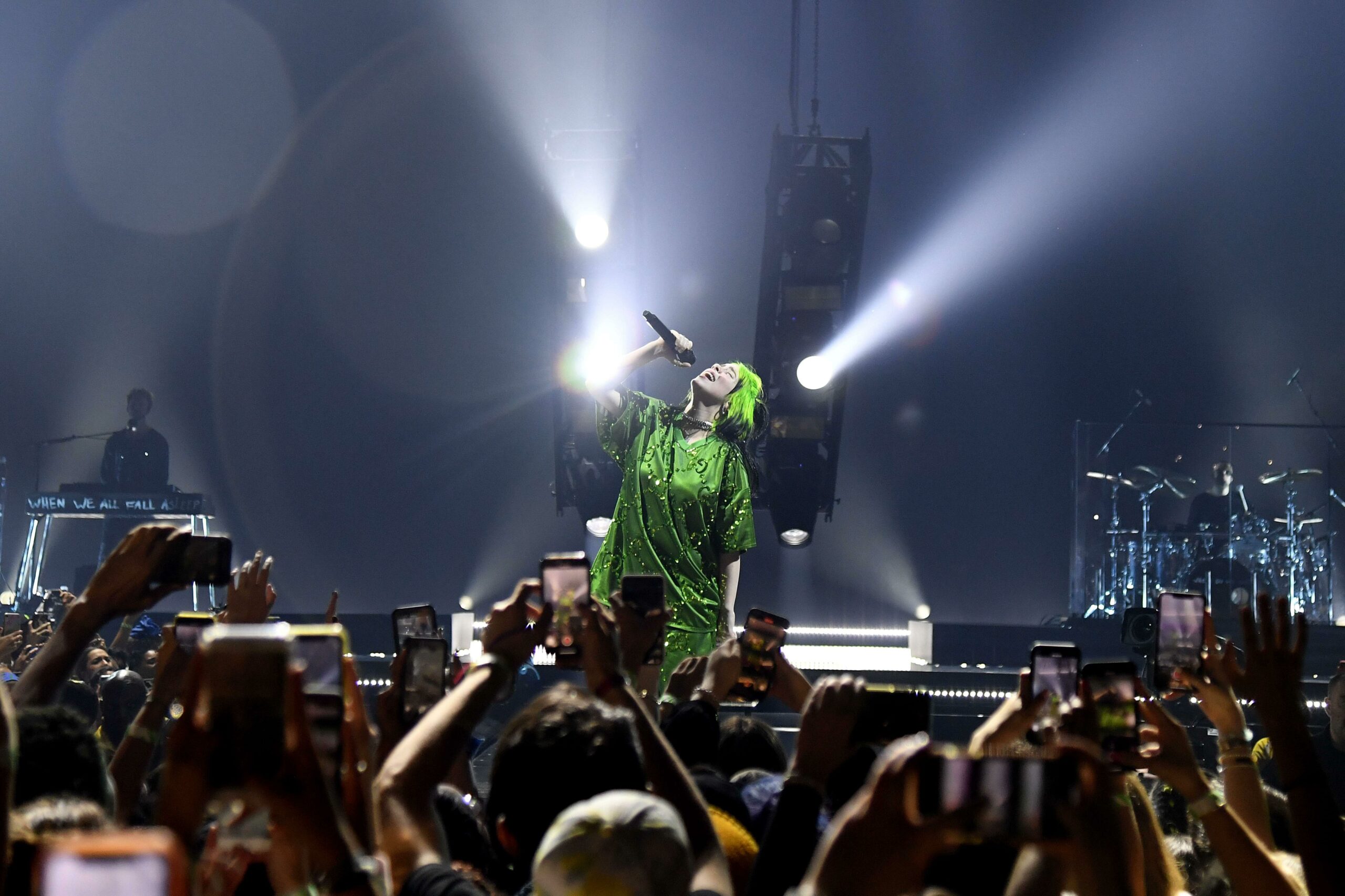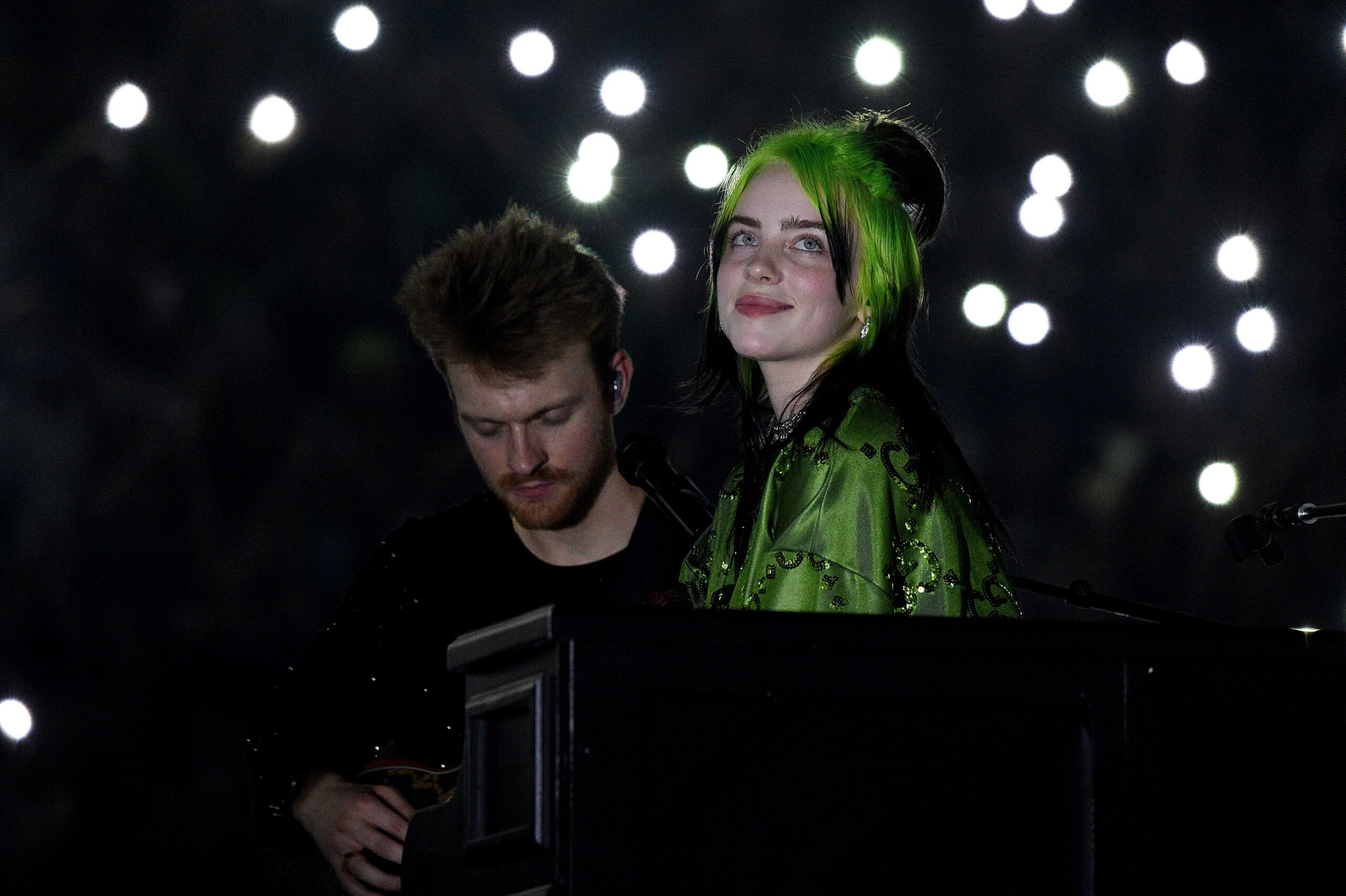
Kevin Mazur/Getty Images for Live Nation – Billie Eilish
launches “Where Do We Go World Tour” in Miami at AmericanAirlines Arena on March 9, 2020.
Eight minutes before Billie Eilish took the stage at Miami’s AmericanAirlines Arena, the capacity crowd began chanting “Billie! Billie!” pause “Billie! Billie!” pause “Billie! Billie!” Largely comprised of teens, pre-teens, parents, LGBTQ young people, Latins and goths, there was an exuberance to the turnout for the decidedly downcast Grammy supernova who seems to embody the despondency of an age of high tech connection/alienation.
By the time the lights dropped at 9 p.m. sharp, the oversized bed that looked like a forgotten ‘60s asylum artifact began being side-strobed in the rhythm of a heartbeat. In a scene straight from Linda Blair’s “Exorcist,” it shook, elevated, rose almost to the second tier as the lumpen sheets shuddered – and then a shackled someone tore through. Clearly struggling, shaken awake from a nightmare, “Bury A Friend” seemed the perfect metaphor for the times — and entrance of pop music’s greatest phenomenon on her first true arena tour.
The struggle was real. Falling through the bed, tangled in a harness, she writhed, tumbled and fell through an opening in the stage. As the audience shrieked – there is a lot of shrieking, as well as gently singing many of the set’s 18 songs with and for her – the cascading flash of lime green Gucci sparkle baggy shorts and shirt became a physical metaphor for the state of youth.
For Eilish, who erupted on the public consciousness at age 13 with “Ocean Eyes,” her live progressive build has yielded not just a performer of supreme confidence, but a trusted voice in a world of regular school shootings, online bullying, sexual assault and Me, Too, ADD/ADHD and a plethora of drugs to “fix” them, body shaming and shrinking opportunities.
That sense of “I understand,” “I feel what you feel” and “I am here for you” permeated her 18-song set with a decidedly personal delivery. These songs were her own response, and yet, her response mirrored the last of Gen X, Gen Y, millennials, Gen Z and more. But even more surprising is the ease and grace she employs in delivering a minimalist show – a drummer and brother Finneas moving from keyboards to drum pads, guitars to bass – with clean lines and high production values.
“You Should See Me In a Crown” turned the entire crowd into one churning, writhing organism. Watching the floor, leaning forward and undulating in time, the audience’s joy and desire for connection was palpable. Eilish seemed to understand, pausing to look into people’s eyes, to smile from a genuine place, to occasionally break into awed conversation.
But mostly, the music flowed over a classic T-shaped stage; but one with a back length, one side and the front of the T built to elevate. Not only did it create dynamics on a completely clean stage, but it afforded the 18-year old the ability to get closer to fans in the higher sections, to walk across the beams – or sit, legs dangling – and offer a casual feeling of interaction.
Like Bikini Kill, L7 and Mia Zapata, Eilish has harnessed a truth for young women who aren’t willing to cede their sexual being, yet she refuses to surrender to sexualizing her reality. Her songs, including “Party Favor: and “Bellyache,” consider “romantic attraction” in ways that honor the sense of it without giving into the “catch a boy” tropes. It is stunning to see the wounding laid out with compassion, but also knowing rejection and the willingness to feel, yet refusal to define oneself by it.

Kevin Mazur/Getty Images for Live Nation – Billie Eilish
performs at AmericanAirlines Arena in Miami on March 9, 2020.
Part of what makes Eilish, whose music is soothing rather than raging, so punk is her sense of truth and refusal. She doesn’t dodge what is shaming, but stands tall within it. In a career based upon wearing baggy, body camouflaging clothes, perhaps her greatest rebellion was a video piece late in the show that played with peeping tom tropes, as her voice and words on the screen leaned into the notion how outsiders feel empowered to define, to judge, to impose morality, value and even ownership on women.
As her fingers found the zipper of an oversized hoodie, played with the pull, threatened/promised to pull it down, she pressed into the ideas of what is dirty, what is prurience and why do others get to decide? It is about opinions and ideas as well as body size and what one wears, further defining how people are cast off.
When she pulls the zipper down, the venue surges with an almost physical release – the pressure of expection torn? Depleted? Impaled? – and then she continues to press, question, slowly running her hand over her clavicle, asking, “Does my shoulder … my hips arouse you?” as she removes the hoodie, turns and reveals herself.
An act of feminism, she rejects ownership by anyone other than herself. It is her body, her decision – and when she pulls her tank top over her head, cries of “She’s going to do it” rang out. She has the power to reveal, not anyone else – and she will do this in a safe place, with people she empowers.
Looking out from the clip, dead-eye, she rebukes a culture intent of marginalizing. As the moment winds down, the chiron/voice-over intones, “Is my value based on your perceptions of me?/ Or is your opinion not my responsibility?” It is stunning, as stunning as the intimacy she creates with songs like “I Love You” and “When I was Older,” the dissolving fluidity of “Wish You Were Gay,” the self-recognition of “All The Good Girls Go To Hell,” delivered with the fire and consumed wings video, and the slightly quickening “Everything I Wanted,” where she offers the greatest gift of all: her willingness to be there for all the people finding refuge in her songs.
In a world of young female breakthroughs based on truth-telling – Alannis Morrissette’s rage, Taylor Swift’s good girl standing up for herself realm, Rihanna’s hot girl empowerment – Eilish, like Holden Caulfield, takes on the not sexy stuff, the pain of being disdained, depressed, alienated or too aware for their own good, and create a cradle of truth and community.

Kevin Mazur/Getty Images for Live Nation – Finneas and Billie Eilish
perform at AmericanAirlines Arena in Miami on March 9, 2020.
With brother Finneas O’Connell’s deep sense of melody and beauty, his exploratory application of song structure and willingness to shift up rhythms, there is an intrigue to her decidedly low impact musicality.
After almost 90 minutes of songs the crowd knew by heart, the young woman who swept the Grammys matter of factly promised, “We only have one more, and I’m not coming out again.”
She thanked her team, the audience, and then unwound the tumbling hit single “Bad Guy” with the verve of a pep rally. Her jacked up homage to the wrong kind of guy was the crowd jumping up and down as they screamed along, picking up momentum and savoring every “DUH!”
Neither a catharsis or a climax, it provided the great fun of the slightly dangerous, but always in control calling it as you see it. After a night of songs that delved into the darkest places, encouraged the idea of seeking help and holding love as a possibility, Eilish sent the audience into the night awash in truth, but also believing in friends, the reasons to hang on and ultimately the power of songs, especially hers, to get you through.


